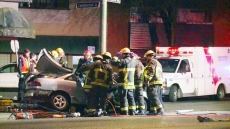Jamie-Lee Ball doesn't plan to quietly let her nightmarish five days in the hallways of the Brampton Civic Hospital fade from public attention.
The 25-year-old is taking her place at the vanguard of a new movement among patients, hoping to draw attention to hospital overcrowding across Canada.
Like others who've gone public to describe indignities suffered in crowded hospitals this year, Ball is becoming an activist — starting petitions, complaining to Ontario's patient ombudsman, and pressuring politicians for improvements.
"It's overwhelming the response I've received," she said in a telephone interview. "A lot of people are realizing they can share their stories, and their hard-earned tax dollars spent on the health system mean they should have the basic necessities."
Ball's mother, Lori Leckie, says: "We want to be the face of this issue."
Ball was among several recent cases to emerge offering frightening accounts of Canadian hospitals struggling to cope with the flow of patients, long waits in emergency, and makeshift hallway medicine.
She arrived at Brampton's ER with intense abdominal pain on March 25. She says she was only admitted after collapsing and screaming in pain on the waiting room floor, and ended up spending five days in corridors on a gurney, unable to eat or drink for days as she awaited tests to diagnose the cause of her internal bleeding.
She likened her sleepless nights to a war scene, as she lay alongside other groaning patients lined up in a corridor behind cloth screens.
"People say they can relate to the experience and ... they're grateful somebody has finally spoken up," she said.
Ontario Finance Minister Charles Sousa told The Canadian Press his provincial budget Thursday will contain funding to deal with overcrowded hospitals, saying: "We don’t want people to be in hallways.”
In Halifax, Kim D'Arcy told her story on Tuesday of how her dying husband Jack Webb spent over six hours on a gurney in the ER hallway of the Halifax Infirmary on Jan. 28. The 68-year-old was also bumped from a private room by another patient and overheard staff saying "If he stops breathing, don't resuscitate" in a recovery room during the final five days of his life.

The problems occurred as the emergency department called special "code census" alerts on 23 out of 30 days in that month, indicating the hospital's ER was unsafe due to overcrowding.
Webb's case has provoked opposition calls for a public investigation, with Nova Scotia's governing Liberals committing to an internal review.
Meanwhile, in Abbotsford, B.C., friends and family have complained of a hasty ER assessment after the death of 56-year-old Mary Louis Murphy.
Murphy visited the hospital on Jan. 30 complaining of chest pains and died later that night after receiving some morphine and being sent home, says 25-year-old Andrew Grimeau, who Murphy was in the process of adopting prior to her death.
In Ottawa, Dana Whitman said she went to the Queensway Carleton hospital in late February and spent four-and-a-half hours in a waiting room despite having a "fever card" given to chemotherapy patients who should be treated quickly when their immune system is depleted.
Like Ball, the 55-year-old has been in touch with the hospital ombudsman and is looking for change.
"We're paying for this through our taxes and it's not working very well," said the law clerk.
Emergency room overcrowding, referred to in the Romanow royal commission 14 years ago as the "canary in the coal mine" for Canadian health care, has been a see-saw battle for decades. It is viewed by researchers as a sign of an inability to move patients into the main hospital wards.
Dr. Howard Ovens, the chief medical strategy officer for the Sinai Health System in Toronto, said Ontario hospitals experienced a surge over the past winter due to the flu, prompting them to come up with "alternative locations" for patients, ranging from hallways to lounges.

When this was combined with spending restraint and the rising age profile of Canadian patients, pressure on hospitals grew intense, said Ovens, who is also the lead adviser to the Ontario Ministry of Health for emergency services.
"If I had to guess, I'd say it's probably gotten a little worse over the last couple of years," said Ovens.
"We've probably had worse periods in the past, but it's probably worse in the last year than the few years before."
In a 2011 paper, Ovens documented how Ontario's 130 emergency departments started to tackle the problem through targeted spending, timely performance data, and a system of financial incentives for hospitals.
Data from the Canadian Institute for Health Information indicates national ER wait times are just over three hours for about 90 per cent of patients — close to the target suggested by the Canadian Association of Emergency Physicians.
However, Ovens said hospitals are continuing to struggle to meet the national goal of being able to shift most patients from ER into an in-patient bed within eight hours.
Some physicians are arguing more can be done to create a culture of efficiency and shared responsibility in hospitals.
Dr. Grant Innes, an emergency physician at the University of Calgary, co-authored a paper which studied 29 Canadian hospitals and found that patients were spending an average of about 48,000 hours a year in ERs due to being "blocked" from entry into other wards.
He calculates this is only about 1.5 per cent of overall bed hours at the hospitals, prompting him to argue much of the problem may be solved if hospitals improve their management of existing beds.
"In our system, accountability is vague ... If nobody is accountable to solve a problem, solutions are unlikely to appear," he says, adding that too many medical departments are content to shift their problems into other parts of the hospital.
Ovens calls for more financial incentives for Canadian hospitals that perform well in finding ways to move beds through their system.
In Brampton, Leckie calls the situation a "humanitarian crisis," and argues that both Ottawa and the provinces need to move rapidly to address a very basic service for Canadians.
"This is a matter of physical pain and emotional pain," she said.




